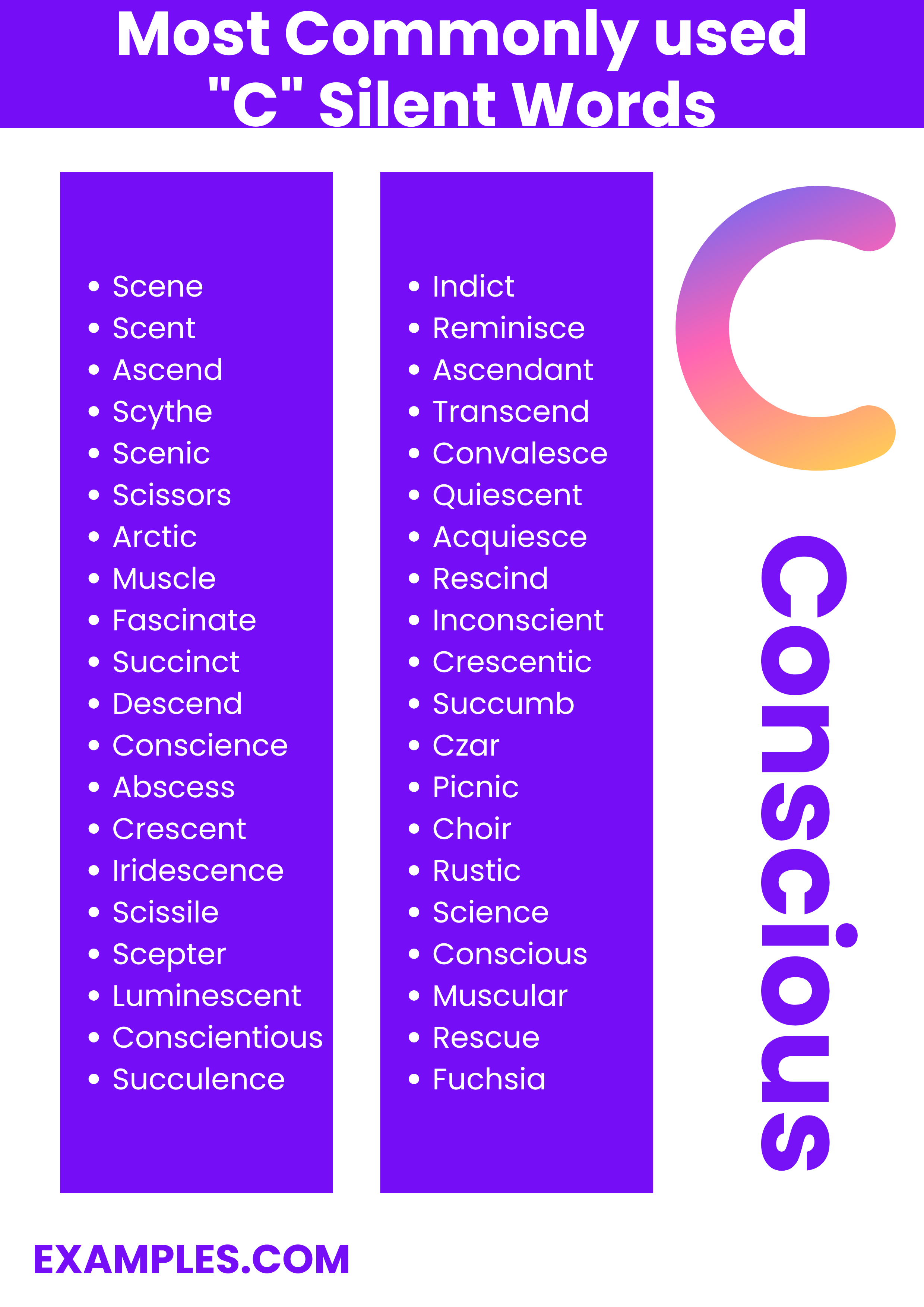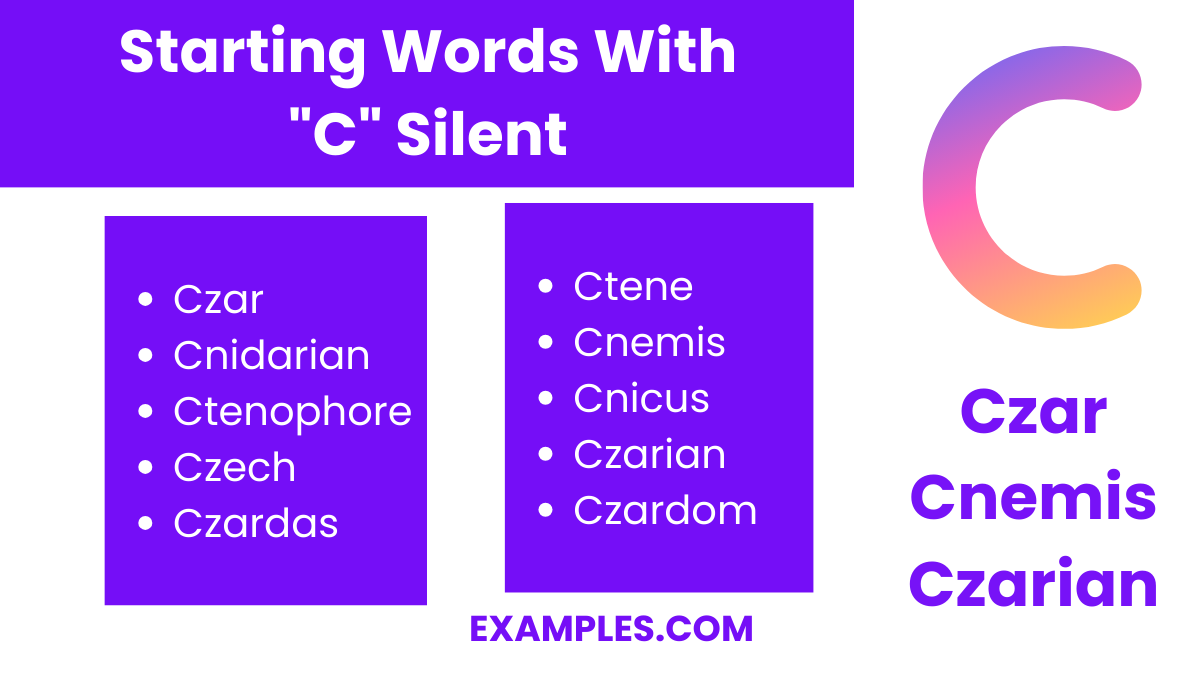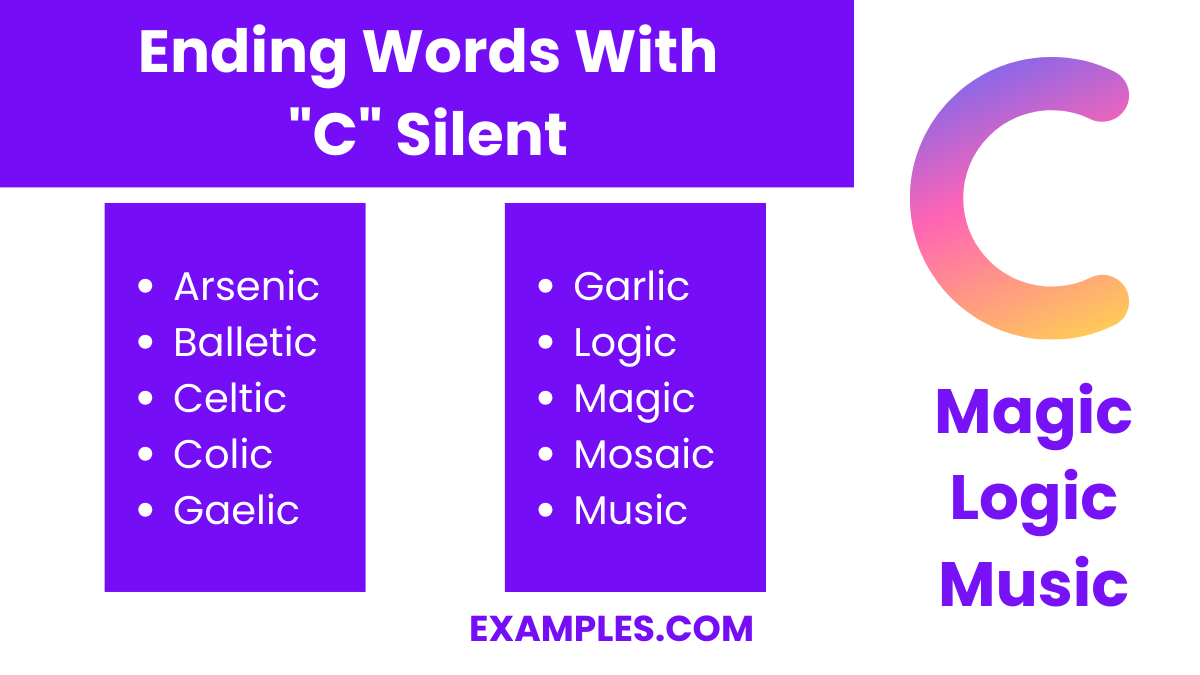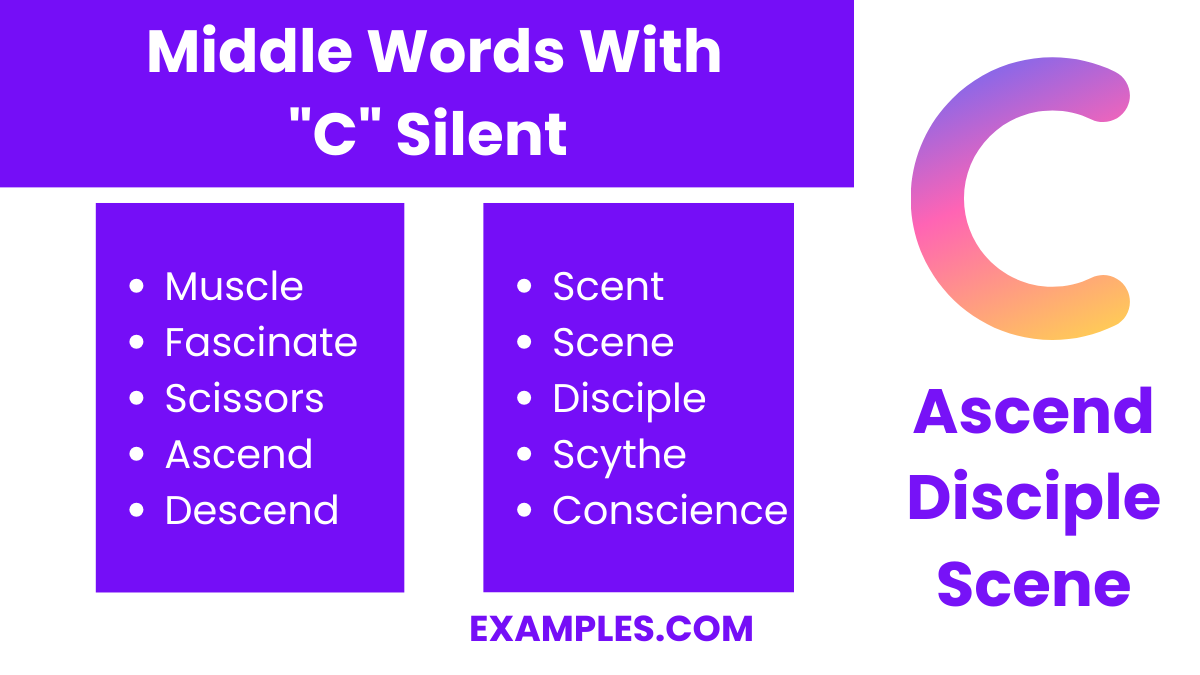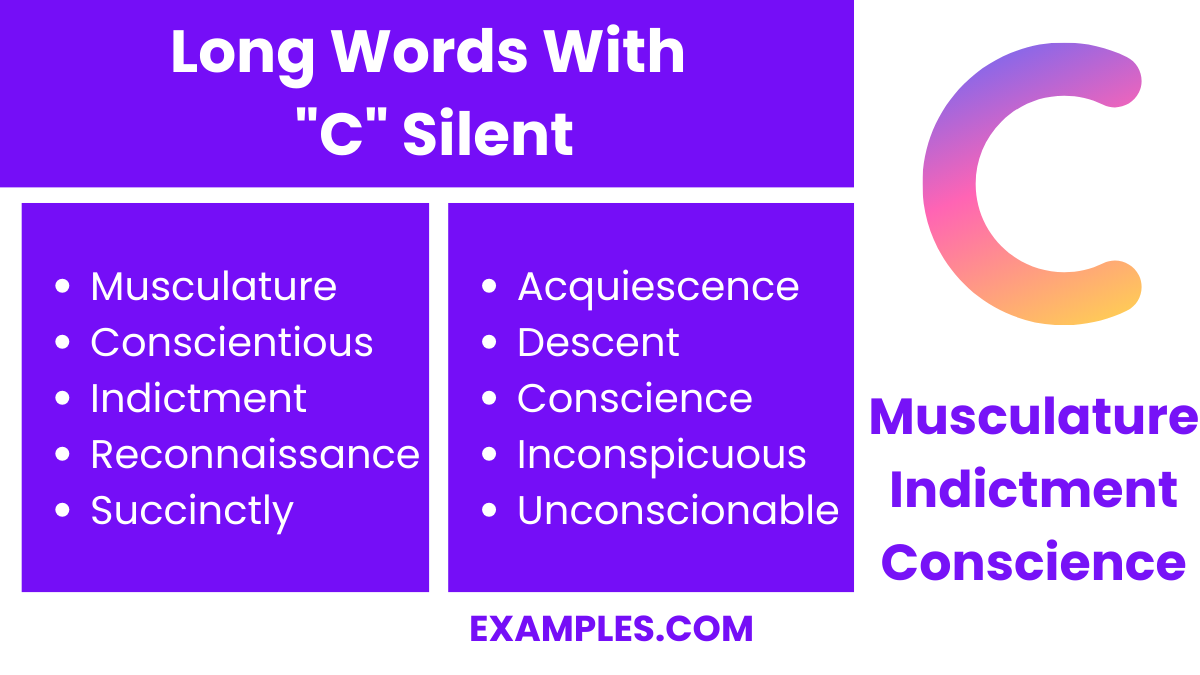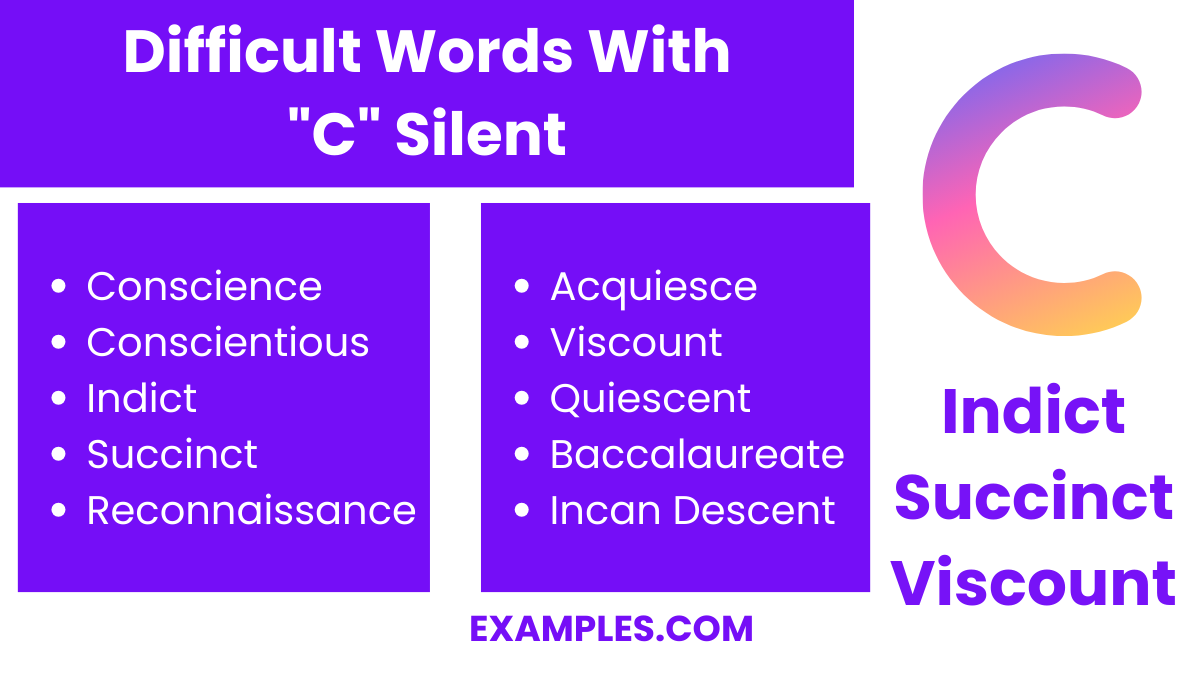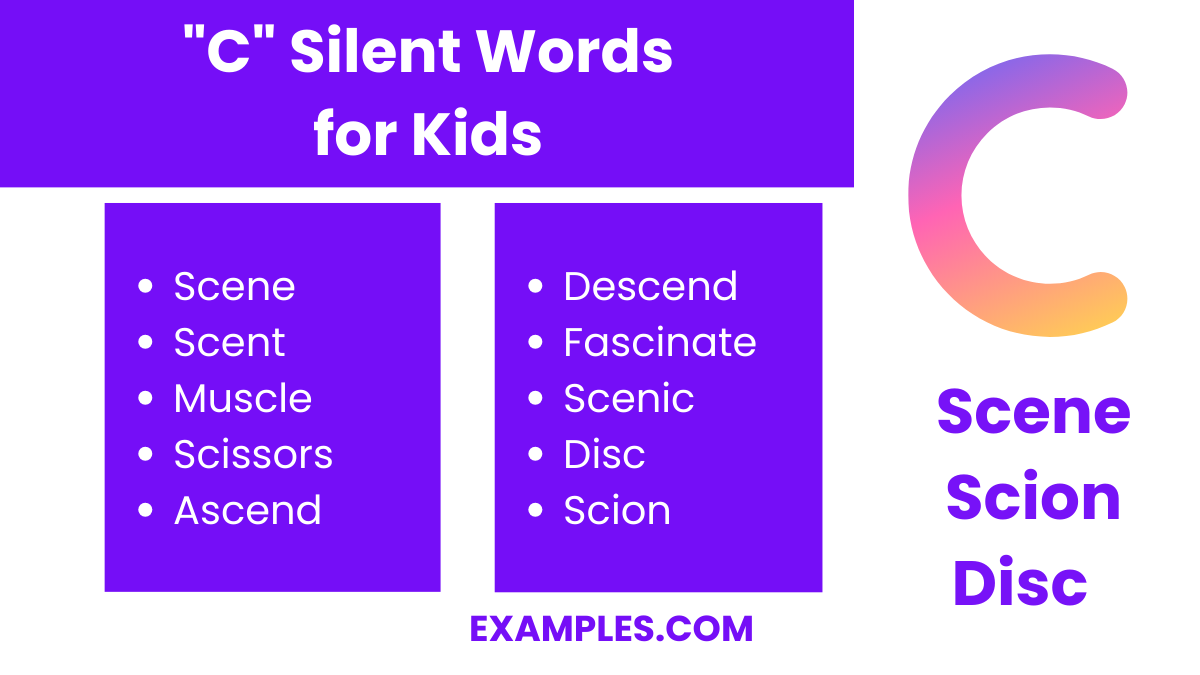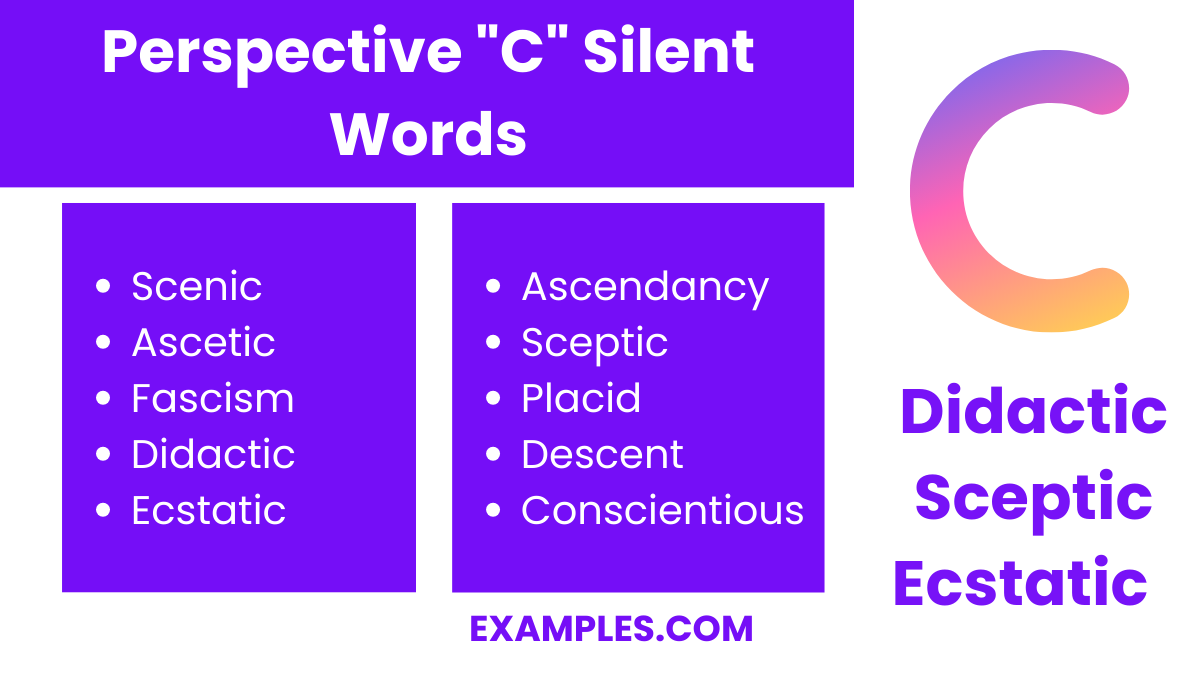450+ C Silent Words List, Meaning, PDF
The English language is filled with curiosities, among which the silent “C” words stands out as a peculiar phenomenon. This intriguing aspect occurs when the letter “C” is written in a word but remains unpronounced, casting a silent shadow over the spoken language. Our exploration into this silent realm reveals a collection of words that carry the silent “C”, offering a unique insight into the complexities and eccentricities of English phonetics. Engage with this fascinating feature to uncover the silent roles that shape linguistic expression.
Download Most Commonly Used Words With C Silent - PDF
50+ Most Commonly used Words With “C” Silent
Exploring the silent “C” in English unveils a hidden layer of linguistic sophistication, where the “C” is seen but not heard, challenging both learners and seasoned speakers alike. This phenomenon enriches the language, offering a glimpse into its complexity and evolution. Words with a silent “C” span various categories, from everyday objects to abstract concepts, making them integral to a comprehensive vocabulary. Understanding and mastering these words not only improves pronunciation but also enhances spelling skills, serving as a cornerstone for effective communication and linguistic fluency. This collection, tailored for educational purposes, aims to support teachers in guiding students through the nuances of daily use English words phonetics, fostering a deeper appreciation for the language’s intricate structure.
| Word | Phonetic | Word | Phonetic | Word | Phonetic |
|---|---|---|---|---|---|
| Scene | /siːn/ | Scent | /sɛnt/ | Ascend | /əˈsɛnd/ |
| Scythe | /saɪð/ | Scenic | /ˈsiː.nɪk/ | Scissors | /ˈsɪz.ərz/ |
| Arctic | /ˈɑːk.tɪk/ | Muscle | /ˈmʌs.əl/ | Fascinate | /ˈfæs.ɪ.neɪt/ |
| Succinct | /səkˈsɪŋkt/ | Descend | /dɪˈsɛnd/ | Conscience | /ˈkɒn.ʃəns/ |
| Abscess | /ˈæb.sɛs/ | Crescent | /ˈkrɛs.ənt/ | Iridescence | /ˌɪr.ɪˈdɛs.əns/ |
| Scissile | /ˈsɪs.aɪl/ | Scepter | /ˈsɛp.tər/ | Luminescent | /ˌluː.mɪˈnɛs.ənt/ |
| Conscientious | /ˌkɒn.ʃiˈɛn.ʃəs/ | Succulence | /ˈsʌk.jʊ.ləns/ | Indict | /ɪnˈdaɪt/ |
| Reminisce | /ˌrɛm.ɪˈnɪs/ | Ascendant | /əˈsɛn.dənt/ | Transcend | /trænˈsɛnd/ |
| Convalesce | /ˌkɑːn.vəˈlɛs/ | Quiescent | /kwɪˈɛs.ənt/ | Acquiesce | /ˌæk.wiˈɛs/ |
| Rescind | /rɪˈsɪnd/ | Inconscient | /ˌɪn.kənˈʃiː.ənt/ | Crescentic | /krɛˈsɛn.tɪk/ |
| Succumb | /səˈkʌm/ | Czar | /zɑːr/ | Picnic | /ˈpɪk.nɪk/ |
| Choir | /kwaɪər/ | Rustic | /ˈrʌs.tɪk/ | Science | /ˈsaɪ.əns/ |
| Conscious | /ˈkɒn.ʃəs/ | Muscular | /ˈmʌs.kjə.lər/ | Rescue | /ˈrɛs.kjuː/ |
| Fuchsia | /ˈfjuːʃə/ | Arson | /ˈɑːrsən/ | Rusticate | /ˈrʌs.tɪ.keɪt/ |
| Silicon | /ˈsɪlɪkən/ | Rescue | /ˈrɛs.kjuː/ | Ascertain | /ˌæsərˈteɪn/ |
| Muscle-bound | /ˈmʌs.əlˌbaʊnd/ | Facsimile | /fækˈsɪ.mɪ.li/ | Scenic | /ˈsiː.nɪk/ |
| Scarcity | /ˈskɛr.sə.ti/ | Incessant | /ɪnˈsɛs.ənt/ | Consciousness | /ˈkɒn.ʃəs.nəs/ |
| Occasion | /əˈkeɪʒən/ | Sacrifice | /ˈsæk.rɪ.faɪs/ | Piccolo | /ˈpɪk.ə.loʊ/ |
| Cyst | /sɪst/ | Sick | /sɪk/ | Crisp | /krɪsp/ |
Starting Words With “C” Silent
Embark on a linguistic journey with our guide to words where the initial “C” whispers in silence, a phenomenon that adds a layer of sophistication to English pronunciation, encompassing both singular & plural words. This curated list unveils words with a silent starting “C,” perfect for teachers aiming to enrich their students’ vocabulary and comprehension of English phonetics. Each word, whether standing alone or in collective form, is a stepping stone to mastering the nuances of language, providing a fascinating glimpse into the silent intricacies that shape our spoken words. Through this exploration, educators can guide students in understanding how the silent “C” operates within various contexts, enhancing their grasp of English’s phonetic diversity.
- Czar (/zɑːr/) – A Russian emperor.
- Cnidarian (/naɪˈdɛəriən/) – A type of marine animal.
- Ctenophore (/ˈtɛnəfɔːr/) – A marine invertebrate also known as a comb jelly.
- Czech (/tʃɛk/) – Relating to the Czech Republic or its people.
- Czardas (/ˈtʃɑːrdɑːʃ/) – A traditional Hungarian dance.
- Ctene (/ˈtiːni/) – A comb-like structure (rare, scientific term).
- Cnemis (/ˈniːmɪs/) – The front part of the tibia (in anatomy).
- Cnicus (/ˈnaɪkəs/) – A genus of thistle-like plants.
- Czarian (/zɑːriən/) – Pertaining to a czar.
- Czardom (/ˈzɑːrdəm/) – The realm or reign of a czar.
Ending Words With “C” Silent
Discover the allure of words where the “C” at the end slips away in silence, a feature that adds a touch of mystery to English pronunciation, particularly with praising words that elevate feedback and encouragement. This selection is ideal for educators seeking to challenge their students with words that defy the expected sounds, enhancing their understanding of the language’s depth and diversity.
- Arsenic (/ˈɑːrsənɪk/) – A toxic chemical element.
- Balletic (/bæˈlɛtɪk/) – Pertaining to ballet.
- Celtic (/ˈkɛltɪk/ or /ˈsɛltɪk/) – Relating to the Celts or their languages.
- Colic (/ˈkɒlɪk/) – Severe abdominal pain.
- Gaelic (/ˈɡeɪlɪk/ or /ˈɡælɪk/) – Relating to the Gaelic languages.
- Garlic (/ˈɡɑːrlɪk/) – A strong-smelling pungent-tasting bulb.
- Logic (/ˈlɒdʒɪk/) – Reasoning conducted according to strict principles.
- Magic (/ˈmædʒɪk/) – The power of apparently influencing events using mysterious forces.
- Mosaic (/moʊˈzeɪɪk/) – A picture or pattern produced by arranging together small colored pieces.
- Music (/ˈmjuːzɪk/) – Vocal or instrumental sounds combined to produce beauty of form, harmony, and expression.
Middle Words With “C” Silent
Venture into the realm of words where the “C” nestled in the middle opts for silence, an intriguing feature that beckons linguists and learners alike, especially when it comes to funny words that bring humor and light-heartedness to language learning. This list, crafted for teachers to share with students, highlights words where the central “C” is seen but not heard, offering a unique twist to conventional pronunciation. Each word, particularly those with a humorous twist, is a testament to the dynamic and evolving nature of English, providing a rich resource for enhancing linguistic skills while adding an element of fun to the learning process.
- Muscle (/ˈmʌsəl/) – A body tissue capable of contracting.
- Fascinate (/ˈfæsɪneɪt/) – To attract and hold attentively.
- Scissors (/ˈsɪzərz/) – A tool used for cutting.
- Ascend (/əˈsɛnd/) – To go up or climb.
- Descend (/dɪˈsɛnd/) – To move downward.
- Scent (/sɛnt/) – A distinctive smell.
- Scene (/siːn/) – The place where an incident occurs.
- Disciple (/dɪˈsaɪpəl/) – A follower or student of a teacher.
- Scythe (/saɪð/) – A tool used for cutting crops.
- Conscience (/ˈkɒnʃəns/) – An inner feeling acting as a guide to rightness or wrongness.
Long Words With “C” Silent
Discover the elegance of long words where the “C” remains an unseen guide, silently shaping the word’s pronunciation without making a sound. This collection, rich in vocabulary and perfect for educational purposes, aims to intrigue and challenge both teachers and students. These words, with their silent “C”, are not just linguistic curiosities but also gateways to expanding one’s command of English, offering a deeper dive into the language’s sophisticated aspects.
- Musculature (/ˈmʌskjʊlətʃər/) – The system or arrangement of muscles in a body.
- Conscientious (/ˌkɒnʃiˈɛnʃəs/) – Wishing to do what is right, especially to do one’s work well and thoroughly.
- Indictment (/ɪnˈdaɪtmənt/) – A formal charge or accusation of a serious crime.
- Reconnaissance (/rɪˈkɒnɪsəns/) – Military observation of a region to locate an enemy or ascertain strategic features.
- Succinctly (/səkˈsɪŋktli/) – Expressed in a brief and clear way.
- Acquiescence (/ˌækwiˈɛsns/) – The reluctant acceptance of something without protest.
- Descent (/dɪˈsɛnt/) – An action of moving downward, dropping, or falling.
- Conscience (/ˈkɒnʃəns/) – An inner feeling acting as a guide to the rightness or wrongness of one’s behavior.
- Inconspicuous (/ˌɪnkɒnˈspɪkjuəs/) – Not clearly visible or attracting attention; not conspicuous.
- Unconscionable (/ʌnˈkɒnʃənəbl/) – Not right or reasonable; unreasonably excessive.
Short Words With “C” Silent
Engage with the subtle charm of short words where the “C” stays silent, a feature that lends a simple elegance to English pronunciation. Ideal for teaching foundational language skills, this list is designed to fascinate and educate, providing students with examples that challenge conventional pronunciation rules and enrich their vocabulary with easily accessible yet intriguing words.
- Scythe (/saɪð/) – A tool with a curved blade for cutting grass or grain.
- Scene (/siːn/) – The place where an incident in real life or fiction occurs.
- Scent (/sɛnt/) – A distinctive smell.
- Muscle (/ˈmʌsl/) – A band or bundle of fibrous tissue that has the ability to contract.
- Scion (/ˈsaɪən/) – A young shoot or twig of a plant; a descendant of a notable family.
- Ascot (/ˈæskət/) – A necktie with broad ends, tied and arranged so that the ends are laid flat, worn chiefly for formal occasions.
- Disc (/dɪsk/) – A thin, flat, circular object or plate.
- Fascia (/ˈfeɪʃə/) – A band or sheet of connective tissue, primarily collagen, beneath the skin.
- Lucent (/ˈluːsənt/) – Glowing with or giving off light.
- Yacht (/jɒt/) – A medium-sized sailboat equipped for cruising or racing.
Difficult Words With “C” Silent
Explore a collection of challenging words where the “C” remains silent, an attribute that adds a layer of complexity to their pronunciation. These difficult words, selected for their difficulty, are ideal for advanced learners looking to push the boundaries of their vocabulary and pronunciation skills. Teachers can use these examples to challenge students, encouraging them to delve deeper into the intricacies of English phonetics and expand their linguistic repertoire.
- Conscience (/ˈkɒnʃəns/) – An inner feeling acting as a guide to rightness or wrongness of one’s behavior.
- Conscientious (/ˌkɒnʃiˈɛnʃəs/) – Wishing to do what is right and to perform one’s duties well and thoroughly.
- Indict (/ɪnˈdaɪt/) – Formally accuse of or charge with a serious crime.
- Succinct (/səkˈsɪŋkt/) – Briefly and clearly expressed.
- Reconnaissance (/rɪˈkɒnɪsəns/) – Military observation of a region to locate an enemy or ascertain strategic features.
- Acquiesce (/ˌækwiˈɛs/) – Accept something reluctantly but without protest.
- Viscount (/ˈvaɪkaʊnt/) – A British nobleman ranking above a baron and below an earl.
- Quiescent (/kwiˈɛsənt/) – In a state or period of inactivity or dormancy.
- Baccalaureate (/ˌbækəˈlɔːriət/) – An examination intended to qualify students for a degree or diploma.
- Incan descent (/ˌɪnkənˈdɛsənt/) – Relating to the descendants of the Incas or their empire.
“C” Silent Words for Kids
Introducing young learners to the silent “C” opens a door to the playful side of English, where letters can be present but not heard. This collection, specially curated for kids, features words that are both educational and fun, perfect for sparking interest in language and its many quirks. Each word is a building block in the foundation of literacy, encouraging children to explore pronunciation and spelling in an engaging and accessible way.
- Scene (/siːn/) – The place where an event occurs.
- Scent (/sɛnt/) – A smell, especially a pleasant one.
- Muscle (/ˈmʌsəl/) – A tissue in the body that contracts to create movement.
- Scissors (/ˈsɪzərz/) – A tool used for cutting paper or fabric.
- Ascend (/əˈsɛnd/) – To go up or climb something.
- Descend (/dɪˈsɛnd/) – To go or come down.
- Fascinate (/ˈfæsɪneɪt/) – To attract and hold someone’s attention completely.
- Scenic (/ˈsiːnɪk/) – Relating to beautiful views or landscapes.
- Disc (/dɪsk/) – A flat, thin, round object.
- Scion (/ˈsaɪən/) – A descendant of a notable family.
Perspectives “C” Silent Words
Delve into the nuanced world of words where the “C” remains unheard, offering a silent commentary on the complexities of English pronunciation, particularly within compound words that weave together elements to form new meanings. This selection is tailored for educators and learners alike, aiming to broaden perspectives and understanding of linguistic subtleties. These words, chosen for their silent “C”, not only enrich vocabulary but also invite reflection on the language’s rich tapestry, challenging speakers to look beyond the surface and appreciate the depth of English phonetics.
- Scenic (/ˈsiːnɪk/) – Relating to beautiful natural scenery.
- Ascetic (/əˈsɛtɪk/) – Practicing strict self-denial as a measure of personal and especially spiritual discipline.
- Fascism (/ˈfæʃɪzəm/) – A political philosophy, movement, or regime that exalts nation and often race above the individual.
- Didactic (/dɪˈdaktɪk/) – Intended to teach, particularly in having moral instruction as an ulterior motive.
- Ecstatic (/ɛkˈstætɪk/) – Feeling or expressing overwhelming happiness or joyful excitement.
- Ascendancy (/əˈsɛndənsi/) – Occupation of a position of dominant power or influence.
- Sceptic (/ˈskɛptɪk/) – A person inclined to question or doubt accepted opinions.
- Placid (/ˈplæsɪd/) – Not easily upset or excited; calm and peaceful.
- Descent (/dɪˈsɛnt/) – The action of moving downward, dropping, or falling.
- Conscientious (/ˌkɒnʃiˈɛnʃəs/) – Wishing to do what is right, especially to do one’s work well and thoroughly.
In conclusion, exploring the silent “C” in words unveils the intricate beauty of English phonetics, challenging both young learners and seasoned linguists. These examples not only enrich our vocabulary but also deepen our appreciation for the language’s complexity. From scenic landscapes to muscular strength, the silent “C” shapes our speech in subtle yet profound ways, inviting us to listen closer and discover more.



